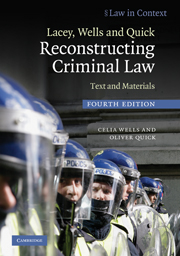Book contents
- Frontmatter
- Contents
- Preface
- Table of cases
- Table of statutes
- Section I Approaching Criminal Law
- Section II Law, Order and Security
- Section III Interpersonal Violence; Drugs and Alcohol Abuse; Offence Preparation and Participation
- Section IV Property and Propriety
- Section V Regulating Sexuality and Bodily autonomy
- 14 The Social Construction of Sexuality and Bodily Autonomy
- 15 Sexual Violence
- 16 Regulating Sexuality
- 17 Criminalising Healthcare Choices
- Section VI Making a Killing
- Bibliography
- Index
- References
17 - Criminalising Healthcare Choices
from Section V - Regulating Sexuality and Bodily autonomy
Published online by Cambridge University Press: 05 June 2012
- Frontmatter
- Contents
- Preface
- Table of cases
- Table of statutes
- Section I Approaching Criminal Law
- Section II Law, Order and Security
- Section III Interpersonal Violence; Drugs and Alcohol Abuse; Offence Preparation and Participation
- Section IV Property and Propriety
- Section V Regulating Sexuality and Bodily autonomy
- 14 The Social Construction of Sexuality and Bodily Autonomy
- 15 Sexual Violence
- 16 Regulating Sexuality
- 17 Criminalising Healthcare Choices
- Section VI Making a Killing
- Bibliography
- Index
- References
Summary
Criminal laws have long had something significant to say about regulating the maternal-fetal conflict. Principally, this has been expressed through provisions in the Offences Against the Person Act 1858 and the Abortion Act 1967. However, scientific and technological advances in the field of reproductive medicine, coupled with shifting expectations and moral attitudes, have prompted the creation of various criminal offences designed to prevent science taking us out of our ethical comfort zone. This takes place at a time when the criminal justice system and healthcare are no longer such strange bedfellows (see Erin and Ost 2007). In this chapter we start by considering the state of the abortion debate today, before moving on to consider criminal law's rather ambivalent attitude to surrogacy and its more clear moral misgivings about cloning. We end by considering the compromises criminal law makes in relation to individual requests for assistance in ending their lives.
Reproductive crimes?
Contraception and abortion
Female sexuality is constructed and regulated through a wide variety of social practices. Significant among these are medical practice and laws on various aspects of reproduction: contraception, abortion, sterilisation and surrogacy arrangements. The use of criminal law as opposed to other forms of regulation appears to be unpredictable, if not arbitrary. Abortion is the clearest and historically best established example of control through criminal powers. Historical evidence shows that abortion has existed in practically all societies (Petchesky 1986).
- Type
- Chapter
- Information
- Lacey, Wells and Quick Reconstructing Criminal LawText and Materials, pp. 596 - 640Publisher: Cambridge University PressPrint publication year: 2010

